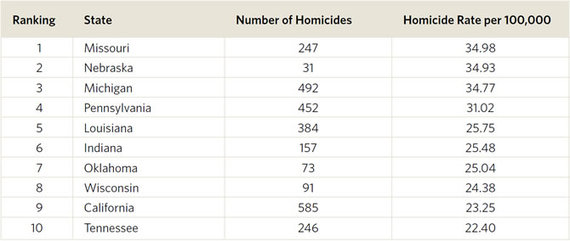Gun violence in America is a public health epidemic. And while this epidemic affects everyone, it has a disproportionate impact on black Americans — men and women, teens and adults. My organization, the Violence Policy Center, educates the public about this epidemic through our annual report, Black Homicide Victimization in the United States. Our most recent report, issued this month, makes all too clear the scope of this ongoing national crisis. Our report found that in 2012, the most recent year for which data is available, the national black homicide victimization rate was 18.03 per 100,000. That is four times higher than the overall homicide rate of 4.50 …
Gun violence in America is a public health epidemic. And while this epidemic affects everyone, it has a disproportionate impact on black Americans — men and women, teens and adults.
My organization, the Violence Policy Center, educates the public about this epidemic through our annual report, Black Homicide Victimization in the United States. Our most recent report, issued this month, makes all too clear the scope of this ongoing national crisis.
Our report found that in 2012, the most recent year for which data is available, the national black homicide victimization rate was 18.03 per 100,000. That is four times higher than the overall homicide rate of 4.50 per 100,000. It is nearly seven times higher than the homicide rate for whites, which is 2.65 per 100,000.
Overall, in 2012 there were 6,565 black homicide victims in the United States. Blacks represent 13 percent of the nation’s population, yet accounted for 50 percent of all homicide victims that year.
Our report also makes clear that the overwhelming majority of black homicide victims are killed with guns. When the weapon used could be identified, 84 percent of black victims were shot and killed with guns. Of these, 76 percent were killed with handguns.
For black men, the homicide rate was a staggering 32.78 per 100,000. For black women, the rate was 4.51 per 100,000, which is two and a half times the overall homicide rate for women nationwide.
It’s also important to understand that the majority of black homicide victims are not killed by strangers. When the relationship between the victim and offender could be identified, 70 percent of black victims were killed by someone they knew. When the circumstances could be identified, 69 percent of the homicides were not related to the commission of any other felony.
And while blacks in America are disproportionately impacted by homicide, the most common scenario as measured by overall homicide victimization is the same: The victim and offender are male and of the same race, the weapon used is usually a gun, and the killing is most likely to be between two people who know one another and not related to another felony crime.
Our report also ranks the states by their black homicide victimization rates. Missouri had the highest black homicide victimization rate in the nation, a position it has held for four of the past five years. The state with the second highest rate was Nebraska, followed by Michigan, Pennsylvania, Louisiana, Indiana, Oklahoma, and Wisconsin.
The Washington Post, using the data in our study, published a map comparing the black homicide victimization rates by state, which you can see here.
Gun violence destroys lives, tears families apart, and traumatizes entire communities. Too many elected officials have ignored this ongoing crisis, as well as the unacceptable fact that black Americans are more likely to die from homicide than Americans of all other races.
And make no mistake: We cannot end this crisis without taking a long, hard look at our nation’s gun laws. Time and again, we have found that states with stricter gun laws and lower rates of gun ownership have the lowest overall gun death rates in the country.
I hope our report can contribute to the necessary conversation among elected officials, community leaders, and average citizens about how we can stop this epidemic. As Milwaukee Police Chief Edward Flynn said in response to the report: “It’s a topic that is devastating neighborhoods, and I invite community leaders to speak more openly and forcefully about it.”
Below are the ten states with the nation’s highest rates for black homicide victimization:
A version of this post appeared on The Frequency, a forum for the Million Hoodies Movement for Justice.
Read article here –
Black Americans Are Four Times More Likely to Be Victims of Homicide






















